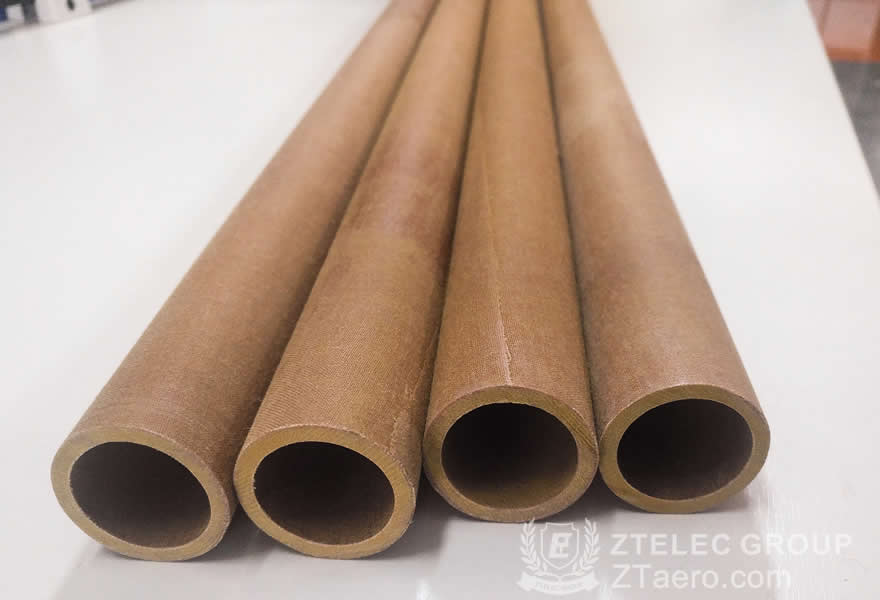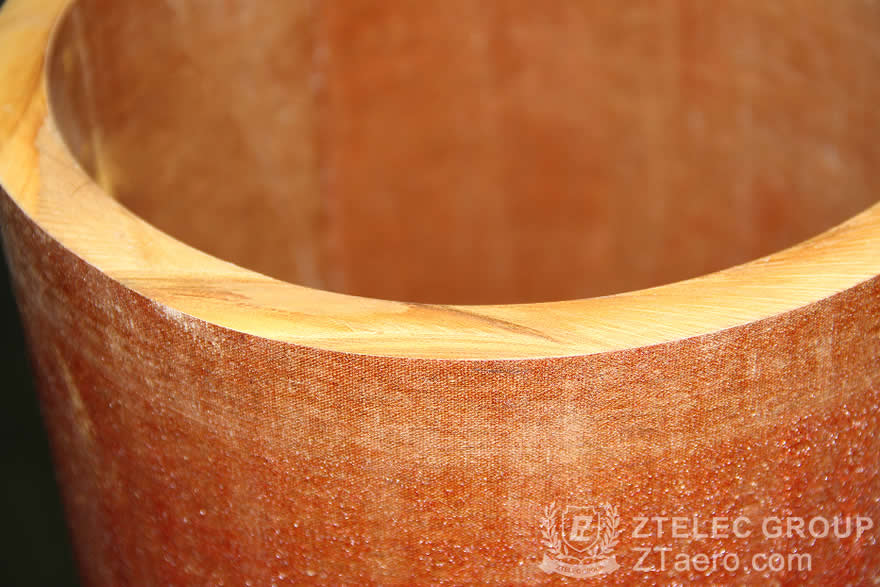Introduction to Phenolic Cotton Cloth Tubes Phenolic cotton cloth tubes are tubular composite materials made by impr...
Phenolic cotton cloth tubes are tubular composite materials made by impregnating cotton cloth with phenolic resin, followed by winding and high-temperature, high-pressure curing. Combining the flexibility of cotton cloth with the heat resistance and chemical stability of phenolic resin, these tubes are lightweight, high-strength, and electrically insulating. They are widely used in mechanical, electrical, chemical, and transportation industries, particularly in scenarios requiring wear resistance, high-temperature tolerance, or insulation protection.

| Parameter | Value Range/Characteristics |
|---|---|
| Dimensions | Inner Diameter: 5-300 mm, Wall Thickness: 2-100 mm (customizable) |
| Density | 1.2-1.3g/cm³ |
| Compressive Strength (Axial) | 80-120 MPa |
| Flexural Strength | 60-100 MPa |
| Tensile Strength | 50-80 MPa |
| Long-Term Service Temperature | 120-150℃ |
| Short-Term Temperature Resistance (No Load) | 180-200℃ (no significant deformation within 30 minutes) |
| Coefficient of Thermal Expansion (CTE) | Longitudinal: 2-3×10⁻⁵/℃, Transverse: 4-5×10⁻⁵/℃ |
| Volume Resistivity | >10¹² Ω·cm (at room temperature, dry conditions) |
| Dielectric Strength | 10-15 kV/mm |
| Water Absorption (24h Immersion) | <1% (by weight) |
| Friction Coefficient | 0.1-0.3 (against steel, dry conditions) |
| Chemical Resistance | Resistant to weak acids, alkalis, and oils; not resistant to concentrated sulfuric/nitric acid |

1. Mechanical and Industrial Applications
Bearing Bushings and Sleeves:
Used in low-speed, high-load equipment (e.g., mining machinery, conveyor rollers) to replace metal sleeves, reducing friction noise and wear.
Advantages: Excellent wear resistance, no additional lubrication required, suitable for dusty environments.
Hydraulic/Pneumatic Conduits:
Serve as pressure-resistant tubes for oil, air, or non-corrosive fluids, with lightweight design reducing equipment load.
Examples: Hydraulic lines for injection molding machines, compressed air tubes.
Guide Rail Covers and Wear-Resistant Liners:
Protect machine tool guide rails and automated equipment slideways from debris contamination, extending service life.
2. Electrical and Energy Applications
High-Voltage Insulation Sleeves:
Insulate transformer leads and high-voltage cable joints to prevent electrical arcing and leakage.
Key Requirements: Dielectric strength >12 kV/mm, smooth surface finish.
Switchgear and Power Distribution Equipment:
Act as insulating support tubes for circuit breakers or busbar isolation sleeves, resisting arc and high temperatures.
Renewable Energy Systems:
Heat dissipation ducts for photovoltaic inverters, high-temperature insulation components in wind power equipment.
3. Chemical and Environmental Applications
Corrosion-Resistant Fluid Pipes:
Transport weak acids, alkalis, or organic solvents (e.g., chemical pump connectors, reactor drain pipes).
Limitations: Avoid exposure to strong oxidizing agents like concentrated sulfuric/nitric acid.
Exhaust Gas Treatment Systems:
Acid-resistant flue liners or scrubber tower supports, operating below 150℃.
Sealing and Connection Components:
Flange gaskets, valve seals resistant to oils and chemicals.
4. Transportation Applications
Automotive and Rail Transit:
Fuel/Oil Lines: Lightweight fuel or lubricant transfer pipes (1/5 the density of steel).
Insulation Components: Insulating sleeves for train pantographs, battery case liners.
Braking Systems: Wear-resistant liners to minimize metal component friction.
Marine and Aerospace:
Seawater-resistant pump/valve connectors, non-load-bearing structural tubes (requires temperature certification).
5. Specialized Tools and Equipment
High-Temperature Tool Handles:
Heat-insulating grips for welding guns or hot air guns, short-term resistance to 200℃.
Laboratory Equipment:
Chemical reagent transfer tubes, high-temperature reactor liners, corrosion-resistant and easy to clean.
Lightweight and High Strength: Low density (1.3-1.45 g/cm³) with compressive strength comparable to metals.
Thermal and Electrical Insulation: Stable performance under high temperatures (150℃ long-term) and high-voltage environments.
Wear and Chemical Resistance: Low friction coefficient, resistance to weak acids/oils, prolongs equipment lifespan.
Ease of Machining: Can be lathed, drilled, or ground for complex assembly requirements.
Temperature Limits: Avoid prolonged use above 150℃ to prevent carbonization.
Chemical Compatibility: Avoid strong acids/alkalis; use alternatives like PTFE in such environments.
Machining Tips:
Use carbide tools at low speeds to prevent delamination.
Ensure ventilation to avoid inhaling phenolic dust.
Allow for thermal expansion gaps (ΔL = CTE × length × temperature difference).
Use elastic adhesives to buffer vibration stress when connecting to metal parts.
Selection and Customization Guidelines
Standard Selection: Choose based on inner diameter, wall thickness, and length requirements.
Enhanced Properties: Add glass fiber (improved strength) or graphite (reduced friction).
Special Environments: Apply high-temperature coatings (e.g., silicone resin) or anti-static treatments.
Testing Validation: For high-pressure/high-temperature applications, request third-party test reports (e.g., dielectric strength, pressure resistance).
Phenolic cotton cloth tubes are indispensable in industrial settings due to their versatility. For optimal performance, select specifications based on operational conditions (pressure, temperature, media) and consult suppliers for technical adaptation if needed.
If you are interested in our products,, please send us a message and we will contact you as soon as we receive it. Email: info@ztelecgroup.com whatsApp: +8616650273778